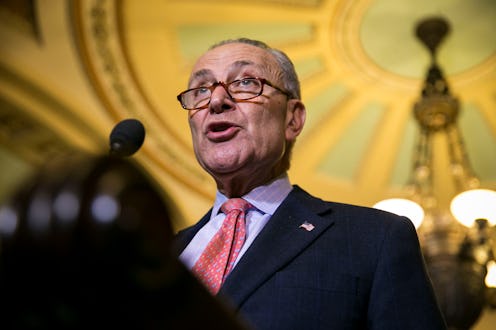News
How Democrats Are Planning To Force The FCC To Kill Its Net Neutrality Decision

On Thursday, the Federal Communications Commission voted by a 3 to 2 margin to undo the Obama administration's net neutrality rules, a controversial decision that was opposed by a wide array of advocates for a free and open internet. Now, in the aftermath of the vote, congressional Democrats are aiming to restore net neutrality, with Senate Minority Leader Chuck Schumer promising a vote on the issue in the weeks to come.
While elected officials' attitudes towards net neutrality have often broken down upon party lines, polling indicates that it's a rare area of overwhelming public consensus. According to a survey conducted this month, a whopping 83 percent of the American public supports net neutrality, including 75 percent of Republicans. In the hyper-polarized political climate of 2017, in which Democrats and Republicans are seemingly at loggerheads over every conceivable issue, those kinds of numbers are few and far between.
The Democrats reportedly plan to attempt to use the Congressional Review Act to undo the FCC's vote. Passed in 1996, the CRA enables the Congress to review regulations recently implemented by federal agencies like the FCC, provided action is taken within 60 working days of the new regulation's implementation. In other words, for the next 60 days that Congress is in session, there's a window of time in which it can act.
The CRA net neutrality bill has been brought forward by Sen. Ed Markey of Massachusetts, and boasts 19 other Democratic co-sponsors, while a similar bill will reportedly be presented in the House. According to The Hill, Markey portrayed the bill as a decision for his Republican colleagues, characterizing it as a choice between support for the American public or support for massive telecom corporations.
Our Republicans colleagues have a choice — be on the right side of history and stand with the American people who support net neutrality, or hold hands with big corporations who only want to increase their profits at the expense of consumers and our economy.
To be clear, both bills would require Republican cooperation to pass, as the GOP controls both the House and Senate. Under normal circumstances, the massive popularity of net neutrality might put pressure on the Republicans to join forces with the Democrats — 83 percent overall support, again, is no small feat. But the GOP has recently made it clear that it's not as bound by public sentiment as it might once have been, having fallen just one vote short of passing a historically unpopular health care bill, and appearing poised to pass an upper-class tax cut that's also deeply unpopular.
Even further, the barrier for a veto-proof majority is incredibly high, perhaps prohibitively so. It would require a two-thirds majority vote in order to be enacted against the wishes of President Donald Trump; anything shy of that mark would require his signature, and there's no indication he would sign off on rescinding the telecom industry and his own FCC chair's preferred policy.
In short, while there's still a path forward for net neutrality advocates, it's a very challenging and unlikely one. It's also clear that people in the president's immediate circle are just fine with the FCC's decision — his son Don. Jr. for one.
This embrace of the CRA might also be slightly awkward for several Democrats. Back in May, New Jersey Sen. Cory Booker, with co-sponsorship from New Mexico Sen. Tom Udall, proposed a bill repealing the CRA, on the grounds that Trump had used it "to abolish fourteen critical protections for hard-working Americans without a single hearing or markup." Rhode Island Rep. David Cicilline proposed a companion bill in the House; this bill was also co-sponsored by Michigan Democratic Rep. John Conyers, who has since announced his resignation amid allegations of sexual harassment.